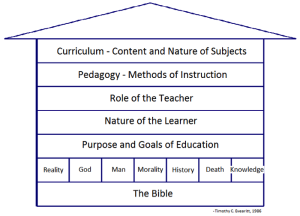At the beginning of the school year, the FPD faculty and staff met to review FPD’s biblical worldview perspective on education. Dr. Barry Shealy, FPD’s Assistant Headmaster, led the discussion. Below is his explanation on what it means to teach from a biblical worldview.
Everyone has basic presuppositions that affect the way they think about and respond to the world and life. We call these ideas a “worldview.” For many people, their worldview is unspoken and shaped by circumstances and up-bringing. Others, more or less thoughtfully, construct their own understanding. In whatever way our worldviews are developed, they shape our choices, values and commitments every day.
At First Presbyterian Day School, worldview construction is a critical part of our mission. One FPD Core Value is to base all we do on a biblical world and life view. So what is a biblical worldview and what does it mean to base education on one?
The faculty at FPD regularly considers this question and it is an ongoing concern in Christian education around the world. In June, FPD High School Principal Matt Kitchell and I participated with Christian school leaders from around the country seeking to develop resources for schools fleshing out these worldview implications. When the new school year began at FPD, I led the faculty in thinking through the elements of a worldview in hopes that we may contribute to this national discussion on Christian worldview implications in the classroom.
What is a worldview?
A worldview provides answers to essential questions. A common approach is to answer the seven questions –
- What is real?
- What/who is God?
- What/who is humankind?
- What is morality?
- How do we think about history?
- What happens after death?
- How do we know?
What is the foundation for biblical worldview?
Evangelical Christians see the questions above as answered by the Bible and influenced by understanding creation, the fall and entrance of sin into creation, redemption through Jesus Christ, and our hope of glory in heaven. A good brief summary may be found in Philip Ryken’s booklet What is the Christian Worldview? We will be reading this book as a faculty this year.
What implications does a biblical worldview have for education?
First, what is teaching from a biblical worldview NOT? A Christian school is a community and one should see a loving, caring, Christ-centered environment. However, simply having such an environment does not make a school a Christian school. The Christian worldview should influence all decisions made in and out of the classroom. It is not simply opening class in prayer (although I and other teachers often do that). It is not simply adding biblical passages or unrelated spiritual lessons to a class. However, it is about including biblical perspective relevant to the content. For example, I want my Calculus students to understand that mathematics is a way of thinking. It helps us understand the world around us and to fulfill our responsibilities to care for and appropriately use creation. We talk about that idea often in class and it influences strongly the way I teach the subject.
Generally, a Christian school will think through the implications of a Christian worldview for –
- The purpose and goals of education
- The nature of the learner
- The role of the teacher
- Methods of instruction
- The curriculum – content and nature of subject areas
Donavan Graham’s book Teaching Redemptively, which we read as a faculty a few years ago, is very helpful for thinking through these implications.
Our Goal:
It is FPD’s mission to prepare students for success in college and beyond. We know that in order for students and alumni to change the world for God’s glory they must have the knowledge, skills, and habits of mind necessary for these contexts. They also must be able to listen and critique competing worldviews, cooperate with those with differing perspectives, and act from a biblical worldview and ethic.
